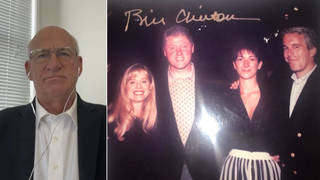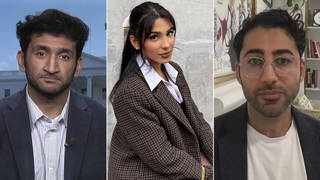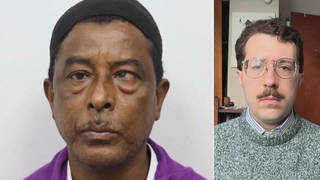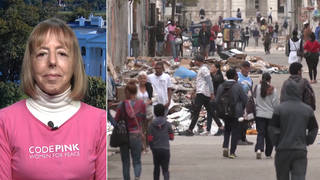
Guests
- Matt Dussexecutive vice president at the Center for International Policy and former foreign policy adviser to Senator Bernie Sanders.
President Trump met with Israeli Prime Minister Benjamin Netanyahu at the White House for a second straight day Tuesday, as Trump’s Middle East envoy, Steve Witkoff, claimed Israel and Hamas were nearing a breakthrough on a ceasefire agreement. Israeli media are reporting Netanyahu is under “extreme” pressure to reach a 60-day ceasefire deal, but Netanyahu’s “interests and the interests of his government remain to make this a perpetual, ongoing war,” says Matt Duss, executive vice president at the Center for International Policy. The U.S.-Israeli proposal would see 10 living Israeli hostages released, along with the bodies of deceased hostages, in exchange for the release of Palestinian prisoners held in Israeli jails. Hamas negotiators are also seeking the withdrawal of Israeli forces, guarantees for an end to the war, the resumption of humanitarian aid shipments overseen by the U.N. and the International Committee of the Red Cross, and an end to the operations of the so-called Gaza Humanitarian Foundation.
Transcript
AMY GOODMAN: President Trump met with Israeli Prime Minister Benjamin Netanyahu at the White House for a second straight day Tuesday, as Trump’s Middle East envoy claimed Israel and Hamas are nearing a breakthrough on a ceasefire agreement. It’s not clear what Trump and Netanyahu discussed behind closed doors, but Israeli media are reporting Netanyahu is under “extreme” pressure to reach a 60-day ceasefire deal that would see 10 living Israel hostages released, along with the bodies of dead hostages, in exchange for the release of Palestinian prisoners held in Israeli jails. There are more Palestinian prisoners in jails than any time in a quarter of a century.
Hamas negotiators are also seeking the withdrawal of Israeli forces, international guarantees for an end to the war, the resumption of humanitarian aid shipments overseen by the United Nations and the International Committee of the Red Cross, and an end to the operations of the U.S.-, Israeli-backed militarized, shadowy aid group, the so-called Gaza Humanitarian Foundation, known as GHF.
Earlier today, hundreds of starving Palestinians in Gaza were forced to move toward the southern city of Rafah to search for food, after GHF closed its only remaining aid distribution center in the central Gaza Strip. Palestinian officials say more than 770 Palestinians have been killed by Israeli forces and U.S. security contractors at sites run by GHF since it began operations in May.
Back in Washington, D.C., Prime Minister Netanyahu is set to meet today with Defense Secretary Pete Hegseth at the Pentagon and again at an event tonight featuring the heads of Jewish organizations, evangelical leaders and senior administration officials.
For more, we’re joined in Washington, D.C., by Matt Duss. He’s the executive vice president at the Center for International Policy and former foreign policy adviser to Senator Bernie Sanders.
Matt, welcome back to Democracy Now! Can you talk about the carnage right now in Gaza, whether we’re talking about starvation or Israeli bombing of civilians? Over the last few days, hundreds more have been killed, this as President Trump and Prime Minister Netanyahu meet in Washington, D.C., and there’s discussion of a possible ceasefire. What do you know?
MATT DUSS: Yeah, I mean, as you said and you described and we’ve all seen with our own eyes day after day, the destruction, the death, the suffering is unspeakable. And we can’t allow it to simply fade into the background. This needs to end.
It’s unclear — you know, you said that there’s pressure being put on Netanyahu by Trump. That may be true in terms of achieving a 60-day ceasefire. But what is — what’s important here is that pressure is sustained to turn this into a durable and permanent ceasefire. That’s what was lacking in the ceasefire that was agreed earlier this year in January before Trump’s inauguration. He put pressure on Netanyahu to agree to that temporary ceasefire, but then Netanyahu, of course, broke that ceasefire agreement and returned to the war, because his interests and the interests of his government remain to make this a perpetual, ongoing war, and that’s what he’s interested in.
AMY GOODMAN: So, talk about the significance of this, what, third meeting of President Trump and Netanyahu since Trump became president once again.
MATT DUSS: Yeah.
AMY GOODMAN: Talk about the meetings that have been held, from Hegseth to Vance, and what is being accomplished here, and what you understand is happening between the negotiators in Doha, the Hamas and Israeli negotiators.
MATT DUSS: Sure. Well, I mean, of course, there’s always, you know, engagement in meetings at multiple levels between multiple officials in the U.S. and Israeli government and in the region. I think what’s the big — one of the big focus of this meeting between Trump and Netanyahu, or this round of meetings, is to kind of try and take a victory lap, as they see it, after the war on Iran, which has paused for the moment. Israel launched its war a few weeks ago in the midst of negotiations between the U.S. and Iran over its nuclear program. Trump eventually launched U.S. airstrikes on Iran’s nuclear program. The actual impact of those strikes are still unclear, but clearly Netanyahu and Trump have an interest in promoting that as a massive success.
The question is, as I said earlier: Does this now translate into attention and focus and pressure from Trump on Netanyahu to get a ceasefire in Gaza? We’ve heard reports of the meetings in Doha, Qatar, between the U.S. and Israeli and Hamas officials and other negotiators, that they are getting closer, but the key sticking point remains Hamas’s central demand, that this agreement lead to a permanent ceasefire. And that is what Netanyahu has always resisted. There has been a deal on the table with this condition from very, very early in this war, from November of 2023. Netanyahu has consistently refused. And unfortunately, just from the public comments from Trump, it seems that Trump, like the Biden administration before him, is willing to give political cover to Netanyahu to pretend that he’s actually interested in a real ceasefire, when clearly he is not. This is a tool of pressure that the United States can and should use if it really wants to get a ceasefire, is to make clear publicly that Netanyahu is the problem here. He is the one refusing. There’s enormous political pressure in Israel from hostages’ families and friends, but not only from them, from the Israeli public more broadly, who are tired of this war, and they want it to end. They want to get the hostages back. But that’s something that Trump, unfortunately, still seems unwilling to say.
AMY GOODMAN: I want to go back to their first meeting on Monday at that long table, where Netanyahu presented Trump with a letter nominating him for the Nobel Peace Prize. Netanyahu also said he was working with the U.S. to find countries, or a country, that would take the Palestinians, claiming that they would be free to leave Gaza voluntarily. This is what he said.
PRIME MINISTER BENJAMIN NETANYAHU: I think President Trump had a brilliant vision. It’s called free choice. You know, if people want to stay, they can stay. But if they want to leave, they should be able to leave. It shouldn’t be a, you know, prison.
AMY GOODMAN: He repeatedly talked about Palestinians’ freedom to choose. Can you talk about in the context of what is taking place in Gaza right now, the starvation, the bombings, the killings, Matt?
MATT DUSS: Yeah, I mean, it’s almost indescribable how dishonest and disgusting that is from Netanyahu. First, let’s step back. Let’s understand that this is an accused war criminal who’s under indictment from the International Criminal Court, which has issued a warrant for his arrest. So, the fact that the president of the United States has welcomed him to the White House is a disgrace to the United States. Every American should feel ashamed and embarrassed about this.
And for Netanyahu to nominate him for a Nobel Peace Prize is — you know, it’s just another example of, you know, foreign leaders understanding that you need to flatter the president of the United States, this president of the United States, in order to get on his good side. But it’s ultimately meaningless. I could nominate my ice cream man for a Nobel Peace Prize just as easily.
But for Netanyahu to refer to Palestinians’ free choice to leave, when you’re facing constant violence, as Palestinians are, it is not a free choice to leave. If Palestinians had their choice, they would stay in Gaza. Gaza is their home. So, to treat this as anything like voluntary is completely dishonest. And I’m actually — it’s really outrageous to see it being reported this way, as if Palestinians are being given the option to continue to live among the rubble and the bombing and the starvation and the disease, or to transfer themselves. This is not in any sense voluntary. This is ethnic cleansing. Multiple human rights organizations and scholars globally have referred to this as a genocide. And I think that is how we need to understand it.
AMY GOODMAN: Now, the International Criminal Court issued arrest warrants for top Taliban leaders for gender violence against women and girls. But earlier, in the last months, they issued arrest warrants for the former defense secretary of Israel and the prime minister, Netanyahu, the U.S. receiving him, not enforcing ICC warrants seeking his arrest for war crimes and crimes against humanity committed in Gaza. Of course, the U.S. is not a signatory to the International Criminal Court. But you have the U.N. special rapporteur on human rights and the situation in the Occupied Palestinian Territory, Francesca Albanese, hitting out at countries that allowed Netanyahu to fly over their airspace en route to the United States, suggesting they may have flouted their obligations under international law. She said on Wednesday the governments of Italy, France and Greece needed to explain why they provided safe passage to Netanyahu. Matt Duss, your response?
MATT DUSS: Yeah, I think special representative Albanese is right. And that is why there’s a massive effort to defame her and to silence her. But I think her point is correct. Countries in Europe that have signed onto the International Criminal Court have a responsibility here, and they have failed in that responsibility.
I would also add that by welcoming Netanyahu, by attacking the International Criminal Court, you know, the Trump administration, as well as other European countries that are failing to honor that warrant, are undermining the work of the court more broadly. You mentioned the warrants against the Taliban leaders. I think those are appropriate. But those Taliban leaders who have now faced indictment for their abuse of women, they are the beneficiaries of this. They are the winners of Netanyahu being welcomed to the White House, just as Vladimir Putin is. Vladimir Putin faces a warrant from the ICC. He is — he’s a big winner here, because you are undermining the work of the court. You’re telling the world that we can just choose to ignore these warrants and these indictments when we choose. That really undermines the work to uphold the set of rules and norms regarding the protection of civilians here.
AMY GOODMAN: And I want to go to Putin in a minute and Trump’s turnaround on the Russian invasion, but I want to ask you one last question. I want to go to a clip of Mike Huckabee, the U.S. ambassador to Israel. This is a recording obtained by CNN from 2016, when Huckabee was running for president. Listen carefully.
MIKE HUCKABEE: Basically, there really is no such thing as — I have to be careful saying this, because people will really get upset. There’s really no such thing as a Palestinian. There’s not.
AMY GOODMAN: “There’s not.” “There’s no such thing as a Palestinian,” Ambassador Huckabee said. Again, I want to quote that. He said, “Basically, there really is no such thing as — and I need to be careful saying this, because people get really upset. There’s really no such thing as Palestinians,” and has supported the annexation, Israel’s annexation, of the West Bank. So, this goes to the meeting that, apparently, or event, that Netanyahu will be attending on his last night here tonight in Washington, D.C., with Jewish leaders and evangelical leaders. You know, there’s CUFI, for example, the Christians United for Israel. I wanted to go to that meeting that they’re going to be having and the role of evangelicals, like Mike Huckabee, a leader of Zionist evangelicals, in supporting Israel. Matt, you personally know a lot about this.
MATT DUSS: Right. I mean, I am quite familiar with Huckabee’s views on this and with the Christian evangelical Zionist view on this. This is part of the community that I grew up in. And I think this meeting tonight is very interesting for Netanyahu, because this is his real base in the United States, is right-wing Christian evangelical Zionists. American Jews overwhelmingly vote for Democrats. They are overwhelmingly liberal, and a huge part of them support Palestinian liberation, a two-state solution, and do not support his government. Unfortunately, conservative Christian evangelicals, as you heard from Mike Huckabee, many of them simply don’t recognize the Palestinians as a people with legitimate claims. They believe that Israel should control all of the land of Israel, even beyond Israel’s current borders, as — partly as a prerequisite for the second coming of Jesus Christ. That’s part of the theology here.
And these, I would also add this — in terms of numbers, this is the biggest part of the right-wing, pro-Israel lobby in the United States. There are far more evangelical Christians than there are American Jews. And these organizations do a lot of the real on-the-ground lobbying in various states and various districts. And this is — as I said, this is Netanyahu’s real political base here in the United States, and he is smart enough to understand that. But we should also understand that the policy they are supporting is deeply inhumane, it is destructive, and it is dangerous for everyone in the United States and in the region.











Media Options